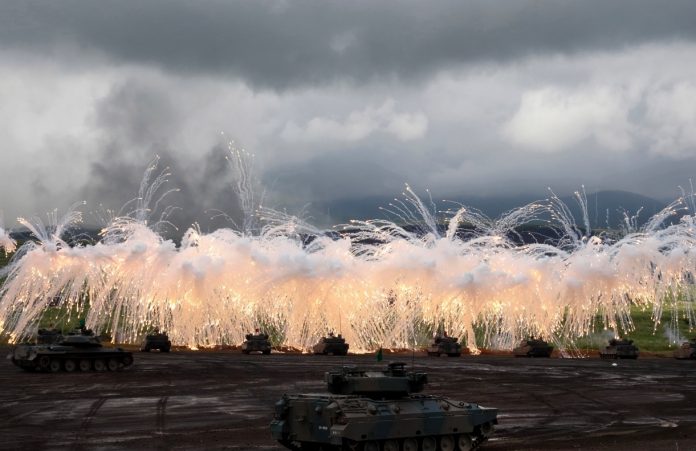
WATCH: (Scroll Down For Video) In a further shift in Japan’s pacifist postwar security policy, the military has begun training to carry out new missions overseas.
Defense Minister Tomomi Inada announced the change for the Self-Defense Forces, saying units would start training Thursday. “It’s natural to make the proper preparations to respond under any circumstances,” she said Wednesday in a briefing.
Under revised security legislation that took effect earlier this year, Self-Defense Force troops will train for a United Nations peacekeeping mission in South Sudan starting in November. That will include troops potentially using weapons to rescue UN staff, and joining troops from other nations in defending the barracks of peacekeepers if they come under fire.
The laws to expand the role of the military were revised after Prime Minister Shinzo Abe’s cabinet reinterpreted the nation’s pacifist constitution. Previously, Japanese peace keepers could only use their weapons to defend themselves if attacked, and that was “limited to the minimum necessary to protect the lives of personnel.”
“It does eventually allow Japan for the first time to come to the rescue for other nations,” said Michael Cucek, an adjunct fellow at Temple University’s Japan campus. “Basically, until now Japan was a lead weight on peacekeeping operations.”
The move could prove controversial in a nation so attached to its pacifist beliefs in the decades since World War II. Huge crowds gathered outside Abe’s office last summer to protest the passage of security legislation.
Still, “it shouldn’t become a political crisis because most Japanese actually agree with the expansion of peacekeeping operations,” Cucek said.
The Self-Defense Forces, founded in the 1950s, were initially limited to fending off any attack on the country’s islands. Japan began making changes after criticism from some analysts during the 1990-1991 Iraq war for contributing $13 billion but no troops.
It took part in later UN peacekeeping operations and sent non-combat troops to the second Iraq war for a reconstruction mission. Each step toward full militarization has been met with unease among ordinary Japanese.
—
Picture: Bloomberg
—
(c) 2016, Bloomberg · Andy Sharp

